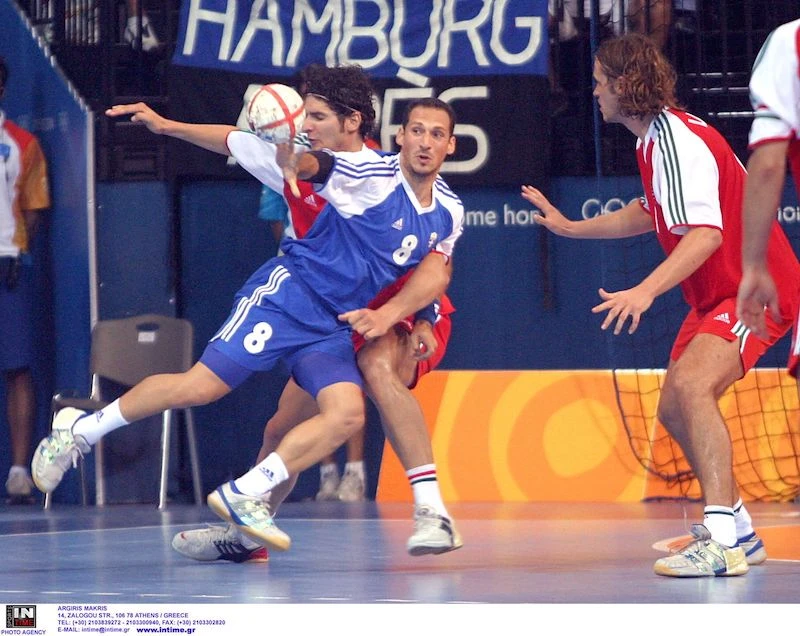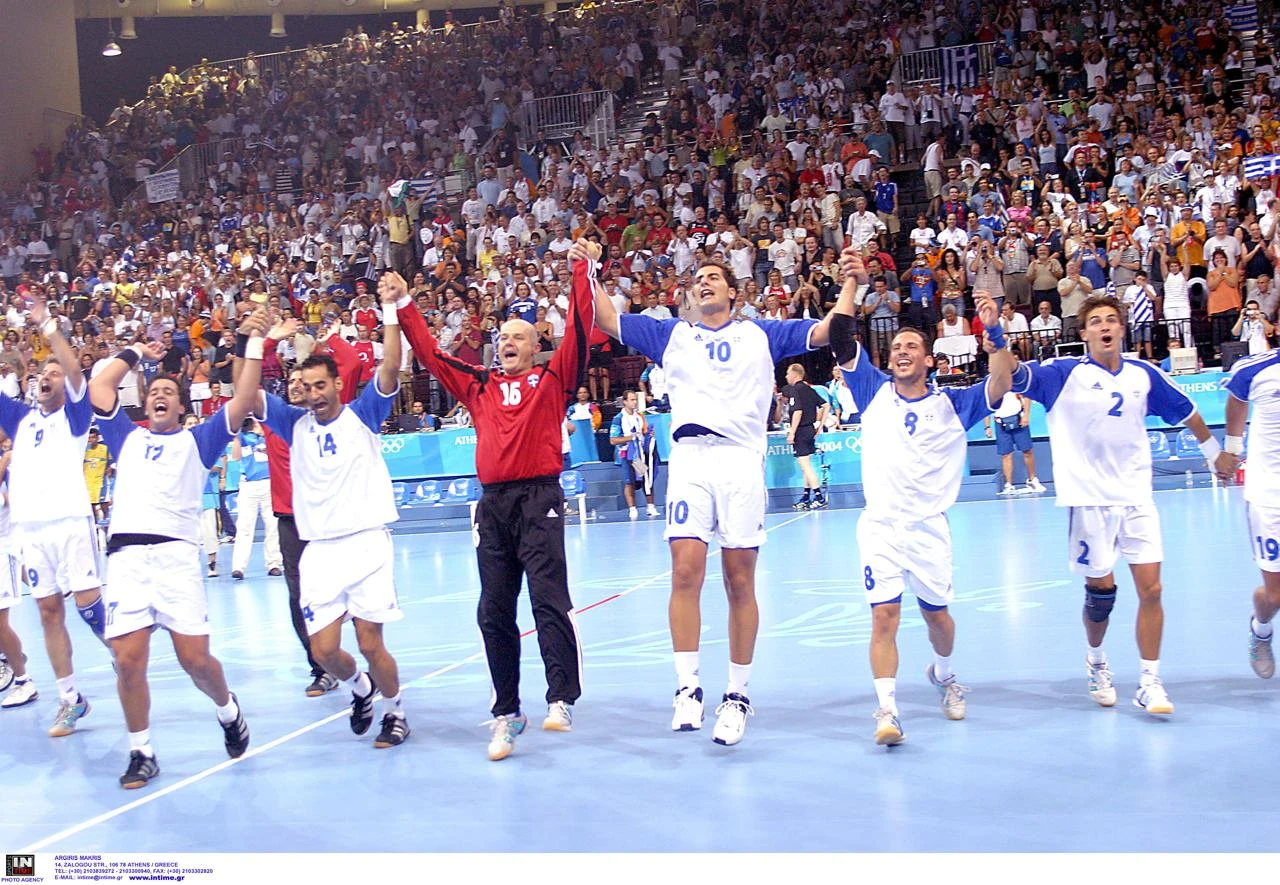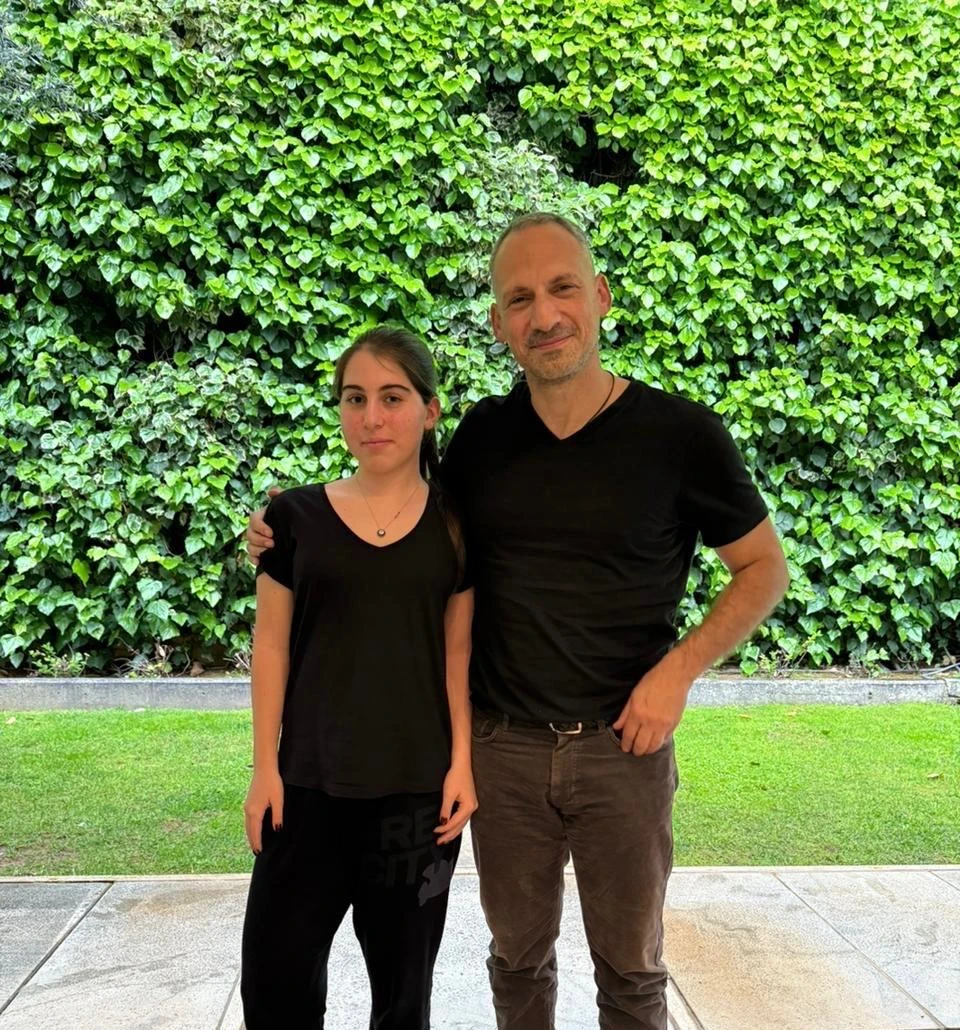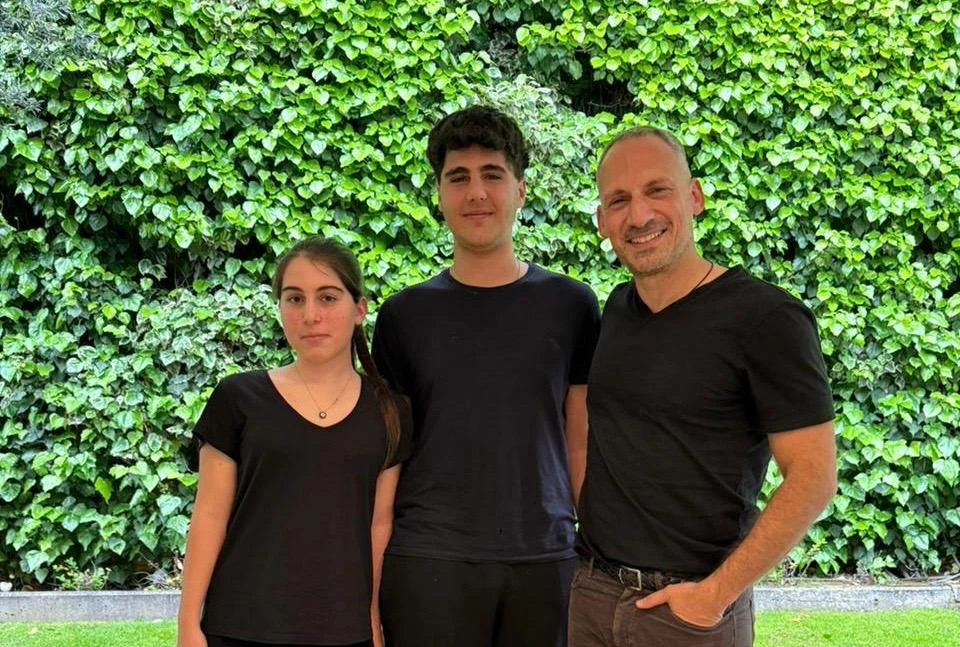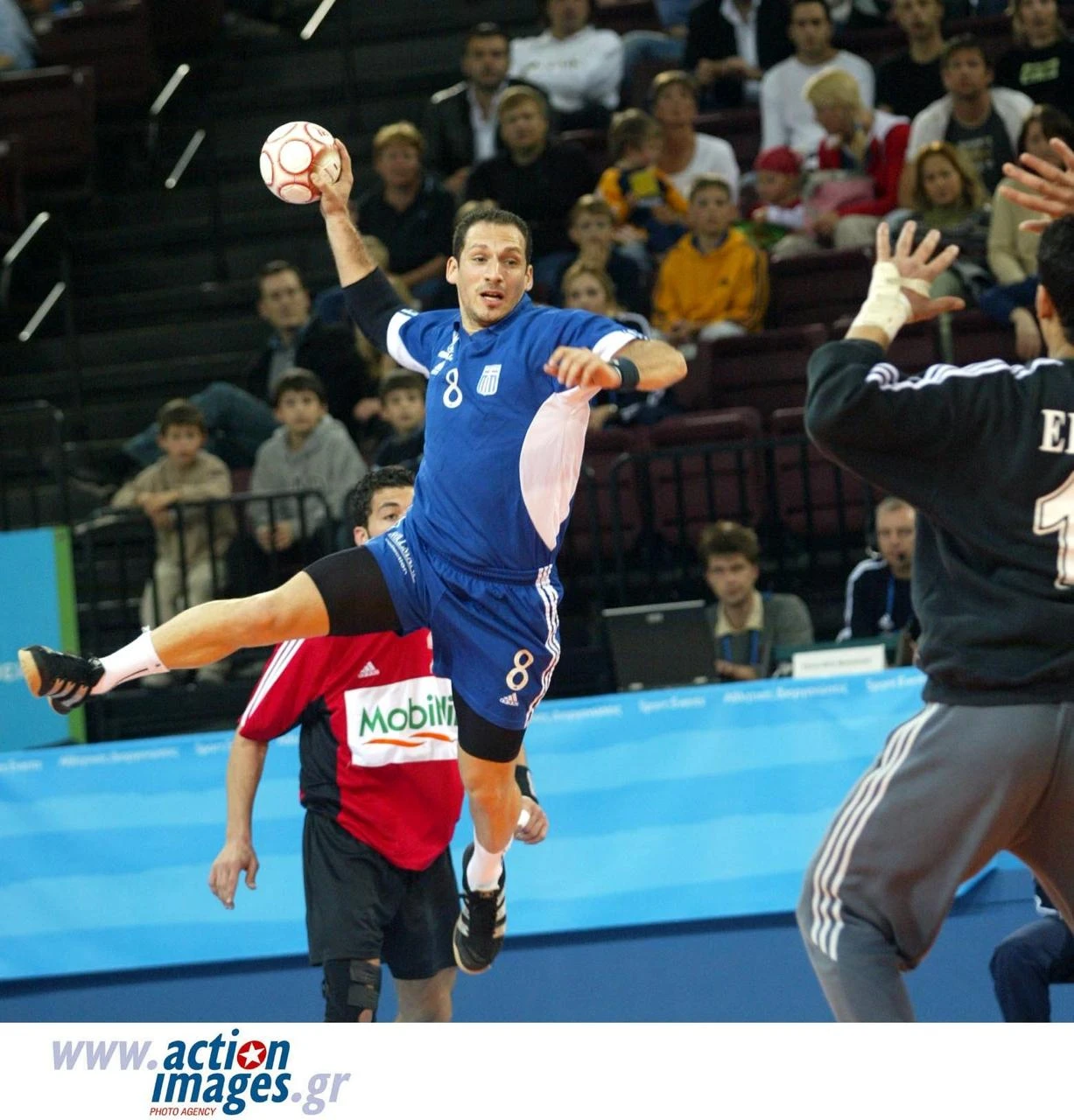Hatsatourian Interview
Published on January, 2025
One of the greatest handball athletes that our country has ever seen, as well as a player of our national team and an Olympic champion, is of Greek- Armenian origin. His name is Grigoris Hatsatourian and he was kind enough to sit down with us for a truly inspiring interview.
Could you please tell us a few words about your Armenian roots? Do you know your family’s past and their history?
Of course I know my family’s history. My grandparents—from both sides—were from Asia Minor, Smyrna and Tarsus. After the Asia Minor Catastrophe, they left their homeland, moved to Athens and settled in Kokkinia, Piraeus, where they had to start from scratch and build a new life. Despite being very poor, they managed to create a highly successful textile company that operated until the late 1980s.
But let’s go back to the beginning. My grandma was around 16-17 years old and worked for a dressmaker at the time. One day, she went to her father and asked him for a sewing machine in order to improve her skills. At first, her father complained because they couldn’t even afford the basic necessities, like food. But then he decided to visit a wealthy Armenian man in the neighbourhood and told him that he wanted to buy a new sewing machine for his daughter, Suzanna. After receiving the money, he secretly purchased the machine under the man’s name. He worked for two years, gathered the money and one day he knocked on his door and said “I’ve brought the money I owe you. Please take it and sign here.”
And that’s how it all started. By 1981, they had established a very large vertical production unit in Renti under the name Hatsatourian, which manufactured yarn, along with various products derived from it. My ancestors came from Thessaloniki. That’s where they first settled and began working in clothing. Today, we run the last remaining textile mill in Greece.
So, as you can see, I know a lot about my family’s history, but unfortunately, I can’t go too far back, because no one remembers. Sadly, no trace of our earlier ancestors remains, and I’ve never been able to find out anything about them. I really wish I could visit these places—Smyrna and Tarsus— and try to find something about them, like lots of my friends did. They travelled there, found their ancestors’ houses and some of them were warmly welcomed by the Turkish people who lived there. However, I too had the opportunity to visit Armenia once. I went to Yerevan five years ago, and I can honestly say it was well worth it.
And that’s how it all started. By 1981, they had established a very large vertical production unit in Renti under the name Hatsatourian, which manufactured yarn, along with various products derived from it. My ancestors came from Thessaloniki. That’s where they first settled and began working in clothing. Today, we run the last remaining textile mill in Greece.
Have you ever felt self-conscious about your distinctive surname or experienced any bullying because of it?
No. I’ve never had an issue with my last name. On the contrary, my parents had instilled in me the belief that I should be really proud of my Armenian roots and surname. So, I can’t recall anything negative ever happening. My nickname has been “Hatsa” since I was a little kid. Even then, I felt proud to be Armenian, without fully understanding why. But the older I got, the more I realized why I felt that way.
Was becoming an athlete something you always dreamed of, or did it just happen?
Since I was a little kid, I’ve been quite sporty and I was especially good at athletics and sprinting. At some point, a PE teacher at school, who was playing handball for the Dukas men’s team at the time, encouraged me to try out a new sport. So, I gave handball a shot, fell in love with it and immediately knew that this would be my sport.
When I was around 20 years old and studying Business Administration at the University of Piraeus at the time, representatives from the Handball Federation visited us and announced that the Olympics would be held in Athens in about five years. They also mentioned that they were bringing in a promising Swedish coach, who would eventually select the top fifteen athletes to compete. So, that’s when it dawned on me that, apart from finishing my studies —because I had worked really hard to get into university—I also wanted to be one of those fifteen athletes in five years. In reality, I wasn’t fighting for just one of the fifteen spots. Each team has two players for each position, so I was actually aiming for one of the two winger spots during those five years.
And here’s where it gets really interesting. The Swedish coach, who was part Armenian, knew the son of a Greek expatriate. So, we all assumed that he would select him for the team, as he had known him since he was a little kid. The boy played in my position, so basically this meant that me and two or three others were fighting for just one spot. It was a real battle to earn a place on the team. What was crazy about this coach was that he didn’t announce the final Olympic team until the night before the opening ceremony. This meant that all twenty of us had already settled in the Olympic village, without knowing who would actually be on the roster the next day. When he finally revealed the names, some of the guys that weren’t selected packed their things and went home.
After I had achieved my goal of making it to the Olympics, my next dream was to win an Olympic title—and thank God, we did it! We finished sixth, and up to that place you’re officially considered an Olympic champion. And keep in mind that it was a newly formed team which had never competed to the Olympics before. Unfortunately, this was the first and last time a handball team represented our country in the Olympic Games.
What was the first team you played for and how did your career progress from there?
I started playing for Dukas when I was a little boy and this is where I ended my career. I was a handball athlete for twenty years and then I stayed involved with the team as an official for some years.
What does playing for the national team mean to you as an athlete?
Playing for the National Team is a tremendous honor in itself. But standing at the centre of the court and hearing the national anthem is truly thrilling. I think that the ultimate goal for any athlete is to compete wearing their country’s colors. So, it’s an invaluable experience.
What does it mean to you to hold the title of an Olympic Champion, especially from the Games that took place in your own country?
The opening ceremony of the Olympic Games was the second most overwhelming experience of my life—right after the birth of my children. The moment I stepped into the Olympic Stadium I got goosebumps. I really believe it was the most powerful ceremony that has ever been held. When we walked into the stadium, our minds were blown. There were also volunteers on both sides who were cheering us on. This is a memory I will always cherish—just like the closing ceremony, which was also unforgettable.
How does a professional athlete balance their duties on the court with personal responsibilities?
I’ve always believed that top-level sport and studies or top-level sport and family can be combined successfully. It just takes a lot of sacrifices and a really strict schedule. Thank God, this is how I made it, because I’m the kind of person who likes to organize everything in his mind—like putting things into boxes. It’s not easy, of course, because you have to be really committed to your goals, be passionate about them and always be willing to work hard every single day.
Drawing from your own experience, what advice would you give to people who want to get into sports?
If I could look back on my journey and ask myself, “What have you learnt throughout all these years?”, the first thing that comes to mind is this: what helped me the most was having a clear vision and knowing exactly what I wanted to achieve. Every night before I fell asleep, I would visualize a specific scene. Even though the stadium hadn’t been built yet, I had a mental picture of it in my mind and I kept imagining that the first game was taking place. I was a part of the team’s starting lineup, the stadium was full of people and the national anthem was playing. I had created this mental image in my head and I would replay it again and again. This is what gave me motivation to keep going and I can finally say that everything worked out the way it was meant to.
I really think that this image was magical, because when I faced setbacks or injuries, this gave me hope that I will manage to get through anything. For example, six months before the Olympic Games, we had some matches and the coach didn’t pick me. I thought that was the end of my career. I remember thinking that “If he’s not selecting me now, that must mean that it’s over”. However, this vision I had was what gave me hope and kept me going. It brought me joy and reassurance that everything would be ok in the end.
So having this mental picture was really important, but so was having a clear goal. This is what I actually tell the little kids when I visit schools: every day, you should give your best. Doing your best doesn’t mean being the best. For example, if we went outside right now and started running, Chris would beat us all, for sure. This doesn’t mean, however, that Niki won’t run as fast as she can. For her, running her fastest doesn’t necessarily mean finishing first. But this is what really matters: giving your best every single day.
I believe that this motto is a way of life, whether this has to do with your goal or not. In the end, if you always give your best—even in things that aren’t directly related to your dream— everything will work in your favor and you’ll eventually make that dream of yours come true.
You’ve recently announced your decision to retire. How does it feel to arrive at such a decision after 20 years of being active?
Well, I stopped playing in 2008 and then I returned for one more year in 2015. This year, I also stepped down from my role as a team official. Letting go of that role too was really hard for me, because I’d spent my whole life working according to a specific schedule. So, I found it really hard to adjust to this big change. I know lots of teammates who also struggle with the same thing. And it’s not just about your body, which has learned to function in a specific way— with all the dopamine and the trainings—there is something else too. You’ve spent your whole life fighting for a goal and suddenly that goal is gone, so you have to start creating new goals outside of the world of sports. If you don’t find meaning in other things, you’ll probably lose yourself. I went through that phase myself too, but with the help of my family and friends I managed to handle it. I took up tennis and tried other sports too, and somehow, I made peace with it all and started having fun again.
Do you do any sports now?
Yes, I play tennis and padel.
Besides school efforts, what are some other ways to instill a sports culture in young people?
Sports is certainly a matter of education. The truth is, a sports culture should be cultivated in schools by encouraging students to get involved, or at home, where parents can guide their kids towards the right direction. Sport is extremely important; not necessarily top-level sport, but any kind of regular physical activity. It is a valuable experience, as it teaches kids self-discipline, respect for boundaries, as well as setting goals and working towards them. When choosing a team sport, you also learn how to cooperate with other people and fight for a common goal—you practically become a family. So doing sports has only benefits to offer and the truth is that it keeps you away from other bad habits too, like alcohol, smoking, or even an unhealthy diet. So, you don’t need to become a top-level athlete in order to be involved with sports; regular exercise alone can make a real difference too.
How do you feel about young people turning to steroids or other performance-enhancing substances in an effort to build strength?
Well, I was lucky because none of the people I knew in the world of sports had ever used illegal substances. I have never had any experience with that, but I understand that it’s quite common in sports. However, it’s something strongly condemned, because the beauty of sports lies in pushing yourself to achieve the best you can, based on your own abilities. So, if you start using performance-enhancing substances you lose the whole meaning. And don’t get me started on how harmful they can be to somebody’s health. We’ve seen many cases of athletes whose health was severely damaged because of these substances and in even more serious cases, they lost their lives.
I believe that it all comes down to the fact that nowadays there is this notion that in order to be accepted you need to look a certain way. That having a specific body image makes you more popular or allows you to have more friends. I think that this is something that can be addressed within the family. What I mean is that if a family is well-structured and the parents are really involved in their children’s lives, it is certain that the kids will grow up knowing what is right or wrong for them. They will understand that they don’t need to conform to other people’s standards or change their appearance to feel accepted, but to always stay true to themselves.
Looking back on everything you have achieved, which accomplishment means the most to you, both personally and professionally?
Looking back on my sports journey I think that the most important thing has been the friendships I’ve created throughout these years and the powerful moments we shared, like becoming Olympic champions and winning titles for the team. But above all else, family comes first. I’m incredibly proud of the family I’ve built and of my two kids, Philip and Armine. My daughter, Armine, was named after my mother. We used to call my mum by her nickname Armik, but her full name in Armenian is Armine.
To conclude, I’d like to mention that me and my family may not have experienced racism, but the first refugees were often treated poorly by the locals. Athenians saw them as outsiders, who had been forced out of their homeland. Even though they managed to rebuild their life here and make it feel like home, they had been forced to leave behind the places they were born. The same thing happened with the Greeks of Smyrna; they were rejected too, at first. They were viewed as Turks and they experienced significant discrimination. However, most of them were well-educated, rich people, who managed to overcome their hardships and flourished here in Greece by creating large businesses and helping Greece recover after 1922.
